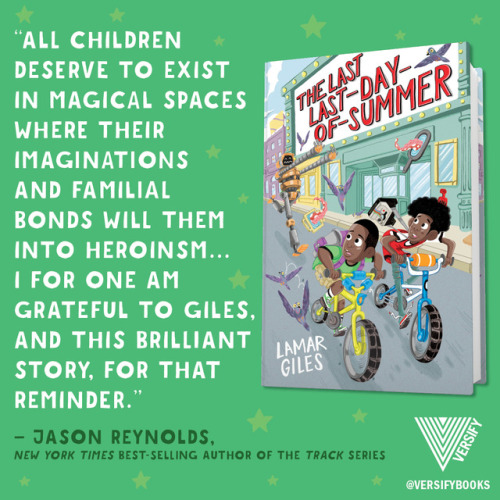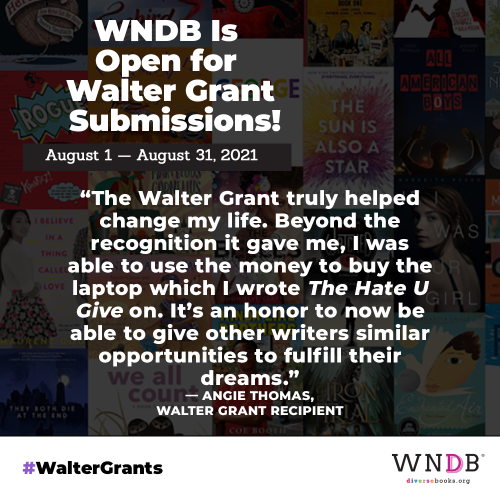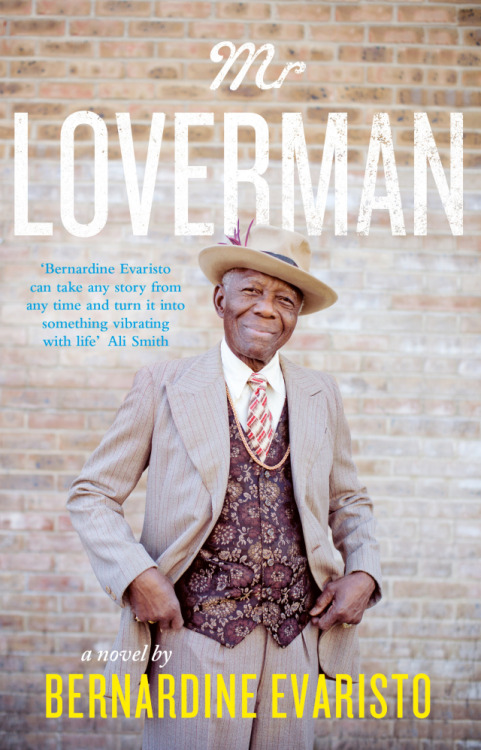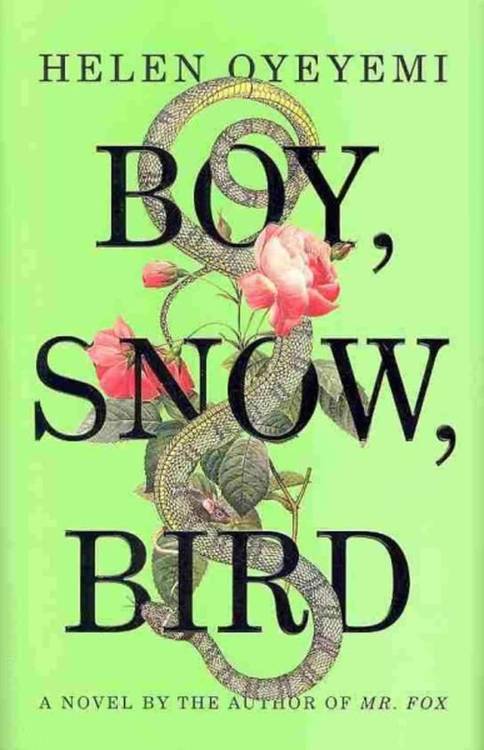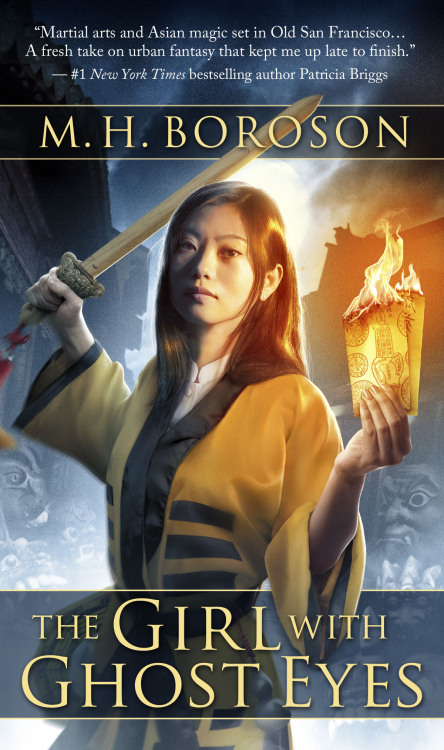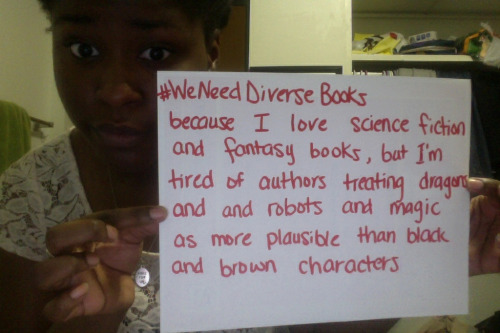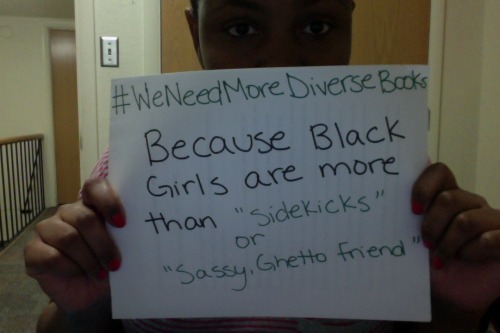#we need diverse books
writingmyselfintoanearlygrave:
I’m low-key tired of all this “diversity makes writing good” bs like… yeah it’s great to include! But it doesn’t automatically make your story good? Idk I personally don’t want to read about an ace person that has the personality of a sack of potatoes just bc they’re ace
Respectfully, I don’t think anybody is saying diversity automaticallymakes a story good (or at least, that’s not my understanding of it.) People are just saying a story withoutany diversity isn’t good writing, which IMO is true?
There’s also a tendency for people to find any reason not to include diversity, by saying things like "but a story can be good without it!” and okay, sure. There are things I enjoy/have enjoyed even if they’re not diverse, but said lack of diversity is definitelya major flaw of those things, and it feels like we should be trying to do better than that?
i get what you’re saying, tho! bad writing is bad writing, diversity or not. but lack of diversity isbad writing in itself, which i think is the point of the general “diversity makes writing good” discourse, and not asking people to engage with flat characters or flat stories ✨
From what I’ve seen, there’s less of an issue of people saying “having a diverse cast automatically makes x thing good” and more an issue of people relying on the diversity of their cast as the primary selling point, which can give the impression that the story doesn’t have much else to offer.
I will admit that when someone pitches their WIP as having “x representation” before any information about the plot or characters, it can put me off a bit. And if they don’t mention the plot or characters much beyond that, I’m likely to pass on it because I haven’t been told enough about the story to get interested.
And, well… if something gives off the feeling of using marginalized people as a marketing gimmick (which is certainly not alwaysthe case but does sometimes happen) then I’m definitely not going to be interested.
Diverse casts are definitely something to embrace, but I can understand the frustration when having one seems to be the onlyfocus. If allI know about your characters is that they’re x marginalized group, the pitch probably needs some work.
This is just what I’ve seen, and I don’t want to invalidate anyone else’s opinion because admittedly I don’t always have time to read through my dash as thoroughly as I’d like. Just my observation.
@roselinproductions Reblogging this version because you explained my point way better than I did lol
Your plot should never take a back seat to diversity, but that doesn’t mean you get to kick diversity out of the car.

We’re thrilled to rekindle Literary Mothers!
We are so proud to announce that the wonderful Grace Jung will be taking the helm of this ship as guest editor from now until mid-May!
Grace is an accomplished writer, filmmaker, translator and Sunday painter. You can find her website at aechjay.com and on Twitter: @aechjay.
Stay tuned for an essay from Grace on her own literary mother and more regular content. We’ve missed you all dearly.
We’re honored to host a cover reveal today for A THOUSAND BEGINNINGS AND ENDINGS, an anthology edited by WNDB’s own Ellen Oh and Elsie Chapman and featuring stories from a diverse group of talented authors. Congratulations!
More information from the publisher:
Star crossed lovers, meddling immortals, feigned identities, battles of wits, and dire warnings. These are the stuff of fairy tale, myth, and folklore that have drawn us in for centuries.
Fifteen bestselling and acclaimed authors reimagine the folklore and mythology of East and South Asia in short stories that are by turns enchanting, heartbreaking, romantic, and passionate.
Compiled by We Need Diverse Books’s Ellen Oh and Elsie Chapman, the authors included in this exquisite collection are: Renee Ahdieh, Sona Charaipotra, Preeti Chhibber, Roshani Chokshi, Aliette de Bodard, Melissa de la Cruz, Julie Kagawa, Rahul Kanakia, Lori M. Lee, E. C. Myers, Cindy Pon, Aisha Saeed, Shveta Thakrar, and Alyssa Wong.
A mountain loses her heart. Two sisters transform into birds to escape captivity. A young man learns the true meaning of sacrifice. A young woman takes up her mother’s mantle and leads the dead to their final resting place. From fantasy to science fiction to contemporary, from romance to tales of revenge, these stories will beguile readers from start to finish. For fans of Neil Gaiman’s Unnatural Creature sand Ameriie’s New York Times–bestselling Because You Love to Hate Me.
so honored and thrilled to be included in this anthology which releases next summer with Greenwillow Books! <3 cindy
Post link
The incredible Jason Reynolds gave some praise to Lamar Giles’ LAST LAST-DAY OF SUMMER! He says “All children deserve to exist in magical spaces where their imaginations and familial bonds will them into heroism…I for one am grateful to Giles, and this brilliant story, for that reminder.”
Just a reminder that Versify Books is a real imprint, started by Kwame Alexander so you know it’s genuine, it’s on Tumblr, and they want submissions from authors of color. You can do it, awesome people!!!
Post link
Banned Books Week is ending, but challenges to books—especially those by/featuring people from marginalized groups—will continue. We’ve compiled resources to help everyone keep advocating for diverse books:
GENERAL BANNED BOOK RESOURCES
- Banned Books Week Official Resources – “The members of the Banned Books Week coalition have a number of resources available to support Banned Books Week programming, promotion of the annual celebration of the right to read, and banned books themselves. Many of these resources can be used throughout the year, so you can celebrate the right to read every day!”
- American Library Association (ALA) Frequently Challenged Books – “We compile lists of challenged books in order to inform the public about censorship efforts that affect libraries and schools. Peruse the following pages to explore banned and challenged books by topic, genre, time, and audience.”
- ALA Banned Books Week Q&A – “This resource offers issues, strategies, and resources for preparing your professional community (teacher librarians and public librarians) to celebrate Banned Books Week.”
- National Coalition Against Censorship (NCAC) Resources – “Learn about your First Amendment rights, what censorship can look like, techniques for preventing it, how to handle incidents of silencing and specific ways to defend free expression in your communities and nationally.”
FURTHER READING
- How to Talk With Students About Banned Books – “[An] important aspect to consider is who is bringing forth the complaint to remove the books. Is there a concerned parent that found graphic violence in a children’s book? Or is there a publishing group that recognizes the harm of continuing to promote outdated tropes? Or is there a group with a political agenda to censor?”
- Why Your Kid Should Read Banned Books – “Five good reasons for kids to read banned books.”
- 5 Things You Can Do to Support the Right to Read – “Whether you’re a librarian, teacher, bookseller, student, or writer, there are a number of things you can do to defend and support the right to read.”
- Are Antiracism Books for Kids Actually Working? – “Books cannot fully inform children on how to combat racism unless they also read books that relay stories and messages from people of color.”
- Windows, Mirrors, and Sliding Glass Doors – Dr. Rudine Sims Bishop’s seminal essay on how reading seeds empathy, especially in children. “Children from dominant social groups have always found their mirrors in books, but they, too, have suffered from the lack of availability of books about others.”
FOR DIRECT CHALLENGES
- ALA Challenge Support – Resources for librarians seeking support (whether in the form of guidance or encouragement) during censorship challenges, including information on when and how to directly contact the Office for Intellectual Freedom, which “is charged with implementing ALA policies concerning the concept of intellectual freedom as embodied in the Library Bill of Rights, the Association’s basic policy on free access to libraries and library materials.”
- National Council of Teachers of English (NCTE) Intellectual Freedom Center – Includes a handbook for educators on responding to book challenges and contact information for NCTE members seeking support/assistance with censorship issues.
- NCAC Book Censorship Action Kit – The NCAC’s “collection of materials on how to effectively fight challenges to books in schools for the use of students, educators, parents, and authors.” Includes advocacy tips, concrete actions, form letters, and more.
- Comic Book Legal Defense Fund – “Comic Book Legal Defense Fund is a non-profit organization dedicated to the protection of the First Amendment rights of the comics art form and its community of retailers, creators, publishers, librarians, and readers. The CBLDF provides legal referrals, representation, advice, assistance, and education in furtherance of these goals.”
- NCAC/CBLDF’S Be Heard! Protecting Your Protest Rights – For students specifically, including guidelines on how to work with school limitations on free speech.
*****
[Video description: Over a series of still images of books and stock footage of reading and learning, the following text displays across the screen:
“Banned Books Week is September 26 – October 2. This annual event celebrates the freedom to read and ‘highlights the value of free and open access to information.’ The first Banned Books Week was in 1982, following a sharp increase in challenges to books in libraries, bookstores, and schools. While most challenges are unsuccessful, if a book is banned, it is removed. According to the American Library Association, parents challenge materials more often than any other group.
The top 10 most challenged books for 2020 include themes of racial justice, stories centered around BIPOC, and LGBTQIA+ content. Of the top 10 most challenged books, 70% were by authors from marginalized groups.
Banned Books Week ‘brings together the entire book community in shared support of the freedom to seek and to express ideas, even those some consider unorthodox or unpopular.’ 2021’s theme is ‘Books Unite Us. Censorship Divides Us.’
‘Ever since the existence of books, there have been those that have wanted to control them. Books are messengers. They can educate and liberate, as well as entertain and invite readers into worlds they never knew existed. Books give people hope.’ — Nicole Klett, ‘How to Talk With Students about Banned Books'”
The video ends with credits acknowledging sources of information: www.ala.organdwww.bannedbooksweek.org.]
Looking for children’s and young adult books by Palestinian authors? Hannah Moushabeck’s list is an excellent place to start:
Children’s Books:
- Sitti’s Secrets by Naomi Shihab Nye, illustrated by Nancy Carpenter
- The Ghoul by Taghreed Najjar, illustrated by Hassan Manasra
- Young Palestinians Speak: Living Under Occupation by Anthony Robinson & Annemarie Young
- Halal Hot Dogs by Susannah Aziz, illustrated by Parwinder Singh
- Farah Rocks by Susan Muaddi Darraj
- Baba, What Does My Name Mean? by Rifk Ebeid, Illustrated by Lamaa Jawhari
Young Adult:
- Don’t Read the Comments by Eric Smith
Tasting The Sky: A Palestinian Childhood by Ibtisam Barakat
Wondrous Journeys in StrangeLands by Sonia Nimr
Graphic Novels for Older Readers:
- Baddawi by Leila Abelrazaq
Mis(h)adra by Iasmin Omar Ata
The Hookah Girl: And Other True Stories by Marguerite Dabaie
Read more about each book (including why Moushabeck recommends them) here!
[Image Description: Graphic featuring the WNDB logo and a tiled square of cover art for 12 children’s and young adult books written by Palestinian authors, set against a colorful background of abstract shapes.]
Post link
Looking for children’s and young adult books by Jewish authors? Katherine Locke’s list is an excellent place to start:
Picture Books:
- Gitty and Kvetch by Caroline Kusin Pritchard, illustrated by Ariel Landy
- The Polio Pioneer: Dr. Jonas Salk and the Polio Vaccine by Linda Elovitz Marshall, illustrated by Lisa Anchin
- Tía Fortuna’s New Home by Ruth Behar, illustrated by Devon Holzwarth
Middle Grade:
- The Magical Imperfect by Chris Baron
The Many Mysteries of the Finkel Family by Sarah Kapit
Recipe for Disaster by Aimee Lucido
Young Adult:
- Strange Creatures by Phoebe North
Cool for the Summer by Dahlia Adler
The City Beautiful by Aden Polydoros
Read more about the books (including why Locke recommends them) here!
[Image Description: Graphic featuring the WNDB logo and a tiled square of cover art for 9 children’s and young adult books written by Jewish authors, set against a colorful background of abstract shapes.]
Post link
Walter Grants are open for submissions now through August 31, 2021! We will award 8 grants of $2000 to unpublished diverse writers & illustrators, including 3 brand new grants, thanks to donors Angie Thomas, A.M. Dassu, Margaret Owen, & Hanna Alkaf.
[Image description: Graphic featuring the WNDB logo, the program application dates (August 1 to August 31, 2021), header text that reads, “WNDB is Open for Walter Grant Submissions!”, and quote text that reads, “The Walter Grant truly helped change my life. Beyond the recognition it gave me, I was able to use the money to buy the laptop which I wrote THE HATE U GIVE on. It’s an honor to now be able to give other writers similar opportunities to fulfill their dreams.” — Angie Thomas, Walter Grant recipient]Post link
We Need Diverse Books (WNDB) will no longer use the term #OwnVoices to refer to children’s literature or its authors and we have removed mentions of #OwnVoices from previously published blog posts. Moving forward, WNDB will use specific descriptions that authors use for themselves and their characters whenever possible (for example, “Korean American author,” or “autistic protagonist”).
#OwnVoices was created as a hashtag by author Corinne Duyvis in September 2015. It was originally intended as a shorthand book recommendation tool in a Twitter thread, for readers to recommend books by authors who openly shared the diverse identity of their main characters. The hashtag was never intended to be used in a broader capacity, but it has since expanded in its use to become a “catch all” marketing term by the publishing industry. Using #OwnVoices in this capacity raises issues due to the vagueness of the term, which has then been used to place diverse creators in uncomfortable and potentially unsafe situations. It is important to use the language that authors want to celebrate about themselves and their characters.
We Need Diverse Books believes in supporting diverse authors and their books, and we will continue to uplift their voices through our programming.
[Image description: Graphic featuring a tiled background of diverse book covers, the WNDB logo, and text that reads, “Why We Need Diverse Books Is No Longer Using the Term #OwnVoices.”]
Post link
Congratulations to the inaugural cohort of the Black Creatives Fund Revisions Workshop! They will receive training from a small faculty of esteemed Black authors to complete revisions of their manuscript and to submit their novel to a team of editors at Penguin Random House (PRH).
[Image description: Graphic featuring the headshot photos of the 2021 BCF Revisions Workshop cohort: Trae Hawkins, Erika J, Ashley Jordan, Ashton Lattimore, Ebonie Ledbetter, Ashleigh Martin, True Michelle, Latina Ramsey, Stephanie Raye, S.P. Rose, P.C. Verrone, and Alyn Wallace. The text reads, “2021 Black Creatives Revisions Workshop Participants”.]
Post link
In honour of Black History Month, we’ve put together a list of some of our favourite books by Black British women. It’s important to remember as Irenosen Okojie wrote in The Guardian that there’s more to Black British literature than Zadie Smith.
The books, from the top row left to right are:
- Yoruba Girl Dancing by Simi Bedford
- Mr Loverman by Bernardine Evaristo
- 26a by Diane Evans
- The Long Song by Andrea Levy
- The Memory of Love by Aminatta Forna
- Boy, Snow, Bird by Helen Oyemi
- The Rose Petal Beach by Dorothy Koomson
- The Spider King’s Daughter by Chibundu Onuzo
- Second Class Citizen by Buchi Emecheta
Post link
The paperback edition of THE GIRL WITH GHOST EYES, coming in October.
“A brilliant tale of monsters, magic, and kung fu in the San Francisco Chinatown of 1898″–Publishers Weekly, STARRED REVIEW
Post link
Attanya: #WeNeedDiverseBooks because I love science fiction and fantasy books, but I’m tired of authors treating dragons and robots and magic as more plausible than black and brown characters
Jennifer: #WeNeedDiverseBooks because… when I was 13 a white girl told me it was selfishthat all of the protagonists in my stories were Latina because she “just can’t relate to nonwhite characters.” She made me feel guilty for writing about people like me.
Aiesha: #WeNeedDiverseBooks because…Black Girls are more than sidekicks or “sassy, ghetto friend”
Facts and Figures About Race/Ethnicity in YA and Children’s Lit:
- 88% of the books on the 2013 Publisher’s Weekly YA Bestsellers were about white protagonists
- 93% of the authors on the 2013 Publisher’s Weekly YA Bestsellers were white authors
- 85% of the books on the 2014 Young Adult Library Services Association’s Best Fiction for Young Adults list were about white protagonists
- 90% of the authors on the 2014 Young Adult Library Services Association’s Best Fiction for Young Adults list were white authors
- 91% of the authors on the 2013 New York Times’s Bestseller Lists for YA and Children’s Lit were white authors.
- According to the 2012 Cooperative Children’s Book Center, only 3.3% of books were about African-American protagonists; only 2.1% were about Asian and Pacific Islander protagonists; only 1.5% were about Latinx protagonists; and only 0.6% were about Native American protagonists. That means over 90% of children’s books surveyed were about white protagonists.
#WENEEDDIVERSEBOOKS
One of the major reasons that this is a problem is because it is easier to get almost any job, including becoming a published writer, if you are white. And since writers write what the know, most white authors will write about write protagonists, which is perfectly okay. The problem is that we need more people of color becoming successful authors, but the racism imbedded in society and industries including the book industry has made this an obstacle.
We want to provide a platform where people of color and other writers who may struggle getting published by mainstream presses can tell their stories!
Metalalia believes everyone deserves to be a protagonist, and that means everyone gets to tell stories too. With their art, with their words, with their music, with their voice. We want to work with diverse content creators to help people tell old, new, beautiful stories greater than the sum of their parts!
Post link
How could I be a tourist in my own past?
Darius the Great is Not Okay - Adib Khorram
Book help!
I have a student that I only see for a half an hour during a time that is half study hall half get to know the treacher time. Yesterday this student told me she has only ever liked/read one book—Wonder. She was born with a cleft lip (and other issues in conjunction) and has had many surgeries. She is a junior in high school and I want her to know that there are more books out there which represent her story.
What books would you recommend? I am completely willing to go out an purchase them for my classroom library.
There are times when you pick up a book having no idea what to expect. For me, one of those books was Soulmated by Shalia Patel. This book, while set in America, deal with two outside cultures–Irish and Indian. Involving two main characters that stretch American YA readers is one thing, but it also employed some fantasy world tactics that give the story enough of a twist to be very compelling. I loved reading about an Indian girl being a love interest…we definitely need more of that in our classrooms.
Today is the cover release for the next book in the series. This series is under the radar, but totally worth a read and it is the type of book that teens are drawn to.
Here is a bit of a synopsis of Fighting Fate:
Empath Liam Whelan is determined to protect Laxshmi “Lucky”; Kapadia, the girl he loves, at allcosts– even if it means breaking her heart to keep her alive. Stopping the joining cold means Liam’s life is in danger from the Soul Seekers and the ruthless Minister Gagliardi who now has designs on Lucky. Liam has no choice but to find the strength to fight his desires, fight the joining, and fight fate.
After the unthinkable happened, Lucky’s “hallucinations” have been working double-time.
Heartbroken and plagued by doubts, she meets a man who gives her a mind-blowing explanation for her predicament. Her apparent savior provides her with an escape from her hell: run away with him or return to her drab existence and watch Liam move on with her heart in his hands. All Lucky ever craved was to be in control of her own fate, but when her only choices fight against her heart, can she find the strength to battle for what she wants?
Here is a link to enter to win an ARC of the book!: ENTER HERE
Shaila’s question to you is: Would you risk death to join (I mean metaphysically, of course!) with your soul mate?
Post link

Last year, the publishing industry’s commercial extravaganza known as “Book Con” invited 30 white male authors and one grumpy cat to participate. Unfortunately, Grumpy Cat was the only non-white female included at the entire convention. For many, that was a problem.
There were no panels featuring women or writers of color—“None. Nada. Zilch,” writer Aisha Saeed tweeted in dismay. With that, Saeed debuted a hashtag created by Korean American author Ellen Oh:#WeNeedDiverseBooks. With remarkable speed, “We Need Diverse Books” became a rallying cry for book lovers everywhere seeking to change the default male whiteness (and grumpy cat-ness) of the book publishing industry.
Change the industry it has, by setting its sights on children’s literature, a genre markedly lacking in diversity despite the known impact that reading has on young minds. Over the course of a year, We Need Diverse Books has morphed from a grassroots movement into an official nonprofit led by Oh, and two other co-founders, authors Malinda LoandCindy Pon. (Disclosure: the author of this article is also a member of the organization.)
The organization boasts the support of such luminaries as Jacqueline Woodson—winner of the 2014 National Book Award for Brown Girl Dreaming—and 2002 Newbery Medal winner Linda Sue Park, who sit on the nonprofit’s advisory committee. With a trademark secured, We Need Diverse Books plans an inaugural book convention under its own auspices to be held in Silver Spring, Md., in summer 2016.
An overwhelming response to the call for literary diversity prompted the website,Bibliodaze, to name Lo, Pon and Oh, together, among the 10 most influential people in publishing in 2014, rounding out a list featuring powerhouse young adult authors such as John Green (The Fault in Our Stars) and Veronica Roth (Divergent).
Crediting the hashtag, #WeNeedDiverseBooks, for igniting crucial conversations in publishing, Bibliodazecommented: “Many have been discussing the lack of diversity in literature for a long time, but what Oh did cannot be looked over because it was thanks to her efforts that the conversation became as widely discussed as it did. You couldn’t ignore it and that was the point. If that hashtag made even one person seek out a book they wouldn’t have before, it did its job.”
Read full article here.
It’s rare that a children’s book about doing a mitzvah tugs at adult readers’ heartstrings, but A Hat for Mrs. Goldmanmight make you cry.
Post link



